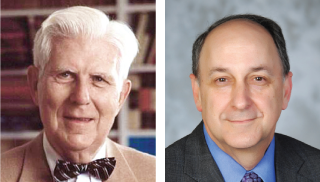Advocates of psychodynamic therapy and cognitive therapy have sometimes been viewed as being at ideological loggerheads. But should they be? At this year’s annual meeting in Philadelphia, two of the most admired proponents of these bedrock psychotherapies will bridge the ideological divide in a special Opening Session event that is expected to attract a standing-room-only crowd.
Aaron Beck, M.D., the founder of cognitive therapy, and Glen Gabbard, M.D., well known as an expert in psychodynamic psychotherapy, will explore the similarities and differences in the two approaches.
The Opening Session will be held Sunday, May 6, at 4:30 p.m. in Terrace Ballroom I-III, Level 4, at the Pennsylvania Convention Center
As in past years, the session will also include the meeting’s opening ceremonies and speeches presented by the APA president and APA president-elect—this year, John Oldham, M.D., and Dilip Jeste, M.D., respectively. The conversation between Beck and Gabbard will follow.
Oldham will moderate the conversation. “The topic is important, since there is increasing evidence of the effectiveness of psychotherapy for many different psychiatric disorders, and there is a growing body of evidence that psychotherapy is a biological treatment that can change the brain,” he told Psychiatric News. “It can be confusing to sort out whether a specific type of psychotherapy is uniquely effective for a given patient with a given disorder, or whether a number of different types of psychotherapy can be useful for patients with the same condition.
“In recent discussions, Aaron Beck, a pioneer of cognitive therapy, and Glen Gabbard, a master expert in psychodynamic therapy, became interested in thinking about common elements shared by both treatments,” Oldham said. “Since many clinicians consider these approaches quite different, it seemed a special opportunity to ask Beck and Gabbard to informally discuss this question, and the Opening Session seemed the best place to do it. Launching the 2012 meeting by diving right into the clinical world of psychotherapy, led by two larger-than-life experts, seemed an idea that couldn’t be beat.”
Beck told Psychiatric News that the idea for the conversation originated when an intern working with Gabbard at the Baylor Psychiatry Clinic came to the Beck Institute for training. “She mentioned that she saw a lot of similarities in Glen’s approach and mine,” Beck said. “She thought that our therapeutic manner was similar and that Glen’s theory of internal representations was similar to my own theories of cognitive schemas. Having heard that, I wondered whether Glen and I might be making similar observations but using a different language to describe them.
“I thought such a conversation would be interesting not only from the standpoint of similarities, but also from the standpoint of what the real differences are in our approaches and what the bases for these differences are,” he said.
Gabbard had a similar reaction. “I wasn’t surprised to hear [the intern’s remarks],” he added. “When Judith Beck [Aaron Beck’s daughter] and I edited the Oxford Textbook of Psychotherapy, we noted that therapists from different backgrounds and training often conceptualized the therapuetic approach similarly. Many sophisticated observers have stressed that so-called common factors, such as empathy, therapeutic alliance, active listening, and others, are at the core of good therapy no matter what the therapist calls his or her approach.”
Gabbard said psychiatrists who attend this event will learn how the two approaches have evolved over time and will become acquainted with the theory and technique of each and of the therapeutic action involved in both approaches. And they will also come to understand the nature of the fundamental differences between the two treatments.
“We live in an era of multiple psychotherapies,” Gabbard said. “It is of great interest to psychiatrists to know which ones work with which disorders and with which patients. Are there unique features of specific psychotherapeutic approaches? Or do they all draw from the same toolbox? Cognitive therapy and psychodynamic psychotherapy have appeared to converge in recent years. This annual meeting event will examine those areas of convergence and divergence in a spontaneous dialogue between two experienced practitioners of cognitve therapy and psychodynamic therapy.”
Beck is University Professor Emeritus of Psychiatry at the University of Pennsylvania, Perelman School of Medicine, and Gabbard is a clinical professor of psychiatry at Baylor College of Medicine and training and supervising analyst at the Center for Psychoanalytic Studies in Houston.


